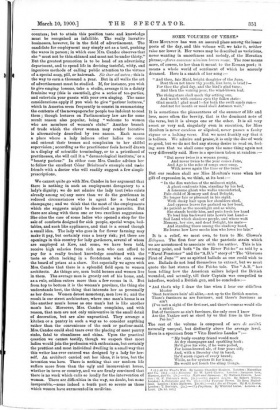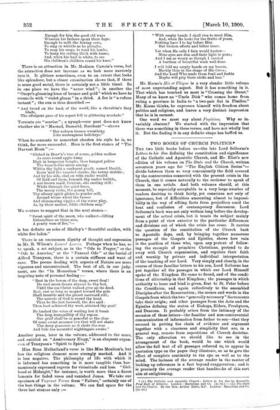SOME VOLUMES OF VERSE.*
Mass MOULTON has won an assured place among the lesser poets of the day, and this volume will, we take it, neither raise nor lower it. Her verses may be described as variations, never wanting in smoothness and melody, of the Horatian phrase,—)fores antoenae nimiura breves rosae. The rose means more, of course, to her than it meant to the Roman poet ; it means a whole world of sentiment of which he scarcely dreamed. Here is a snatch of her song :— "And thou, fair Maid, bright daughter of the June,
Dost thou not know thy youth, like hers, is brief ?— For thee the glad day, and the bird's glad tune ; And then the waning year, the wind-blown leaf.
The rising stars shall mock thy setting sun, And watch with curious eyes thy fallen state :
Glad month ! glad maid !—for both the swift sands run—
And not for month or maid shall Autumn wait."
It is sometimes the pleasantness of the summer of life and love, more often the brevity, that is the dominant note of the verse, but it is always one or the other. It is all very sweet or very sad, singularly even in execution, for Miss Moulton is never careless or slipshod, never passes a faulty rhyme or a halting verse. But we must frankly say that it is tedious. We admire and praise, it is only the due of work so good, but we do not feel any strong desire to read on, feel- ing sure that we shall come upon the same thing again not very differently said. Here is a specimen taken at random :— "But never twice is a woman young, And never twice to the year comes June, And Age is the echo of songs once sung,
With never again the time or the tune."
But our readers shall see Miss Moulton's verse when her gift of expression is, we think, at its best :— " In the dim watches of the midmost night,
A ghost confronts him, standing by his bed, A lonesome ghost who walks uncomforted, Pale child of Memory and dead Delight, No longer fair or pleasant in his sight. With dusky hair upon her shoulders shed, And cypress leaves for garland on her head, As patient as the moonlight and as white, She stands beside him, and puts forth her hand
To lead him backward into Love's lost Land—
Sad Land which shadows people, and where wait
Memory, her sire, and dead Delight, his mate—
And standing there among the shadowy band, He learns how Love mocks him who loves too late."
It is a relief, we must own, to turn to Mr. Clowes's Eclogues. The first four are of the patriotic strain which we are accustomed to associate with the author. This is his strong point, and both "In the River Pei-ho" as told by a "Naval Pensioner" and the "A.B.'s " story of "The Glorious First of June" are as spirited ballade as one could wish to see. Ballads do not lend themselves to extract, but we must quote the last stanza of the Pei-ho tale. The " A.B. " has been telling how the American sailors helped the British wounded, and actually, till their Captain was compelled to interfere, worked a British gun, and he concludes :—
"And that's why I draw the line when I hear our ridiclous bluster
'Bout furriners bein' all alike,—not up to the British muster. There's furriners as are furriners, and there's furriners as ain't (I've met a, sight of the first sort, and there's some as would rile a saint), But of furriners as ain't furriners, the only ones I know
Are the Yankee sort as stood by us that time in the River Pei-ho."
The rest of the volume is composed of tiers de societc; naturally unequal, but distinctly above the average level. Here is a specimen from " Vitaa Rusticsa Laudes " " My burly country friend would mock At dry champagne and sparkling hock: He'd give his vote, if he were polled, For home-brewed ale, of four years old; And, with a Breseley clay in hand. He'd scorn cigars of every brand; While, as for oysters fit tor kings, He would not touch the slimy things.
• (I.) Al the Wind's Will. By Louise Chandler Moulton. London : Macmillan and Co. [es.]—(2.) Eclogues. By W. Laird Clowes. London : Sampson Low, Marston, and Co. [5s.)—(3.) Math and Romance. By Madison Cawein. Lon- don : G. I'. Putnam's Sons. [s.]—(4.) Laurel Leaves. By Robert Wilson. London : A. Constable and Co. [5s.]—(5.) Vagrant Verses. By Rosa Mulhol- land. London : Elkin Mathews. [3s. 6d.]—(6.) The et Ubique. By H. G. Keene. London: T. Burleigh. ps.]—(7.) Fugitives. By Winifred Lucas. London : J. Lane. [3s. 6d. net.]
Enough for him the good old ways Wherein his fathers spent their days: Enough to milk the lowing cows, To sing or whistle as he ploughs, To reap his crops, to tend his lambs, To hang his ceiling thick with hams; And, when his hair is white, to see His children's children round his knee."
There is an attraction in Mr. Madison Cawein's verse, but the attraction does not increase as we look more narrowly into it. It glitters sometimes, even to an extent that looks like splendour, but a closer examination shows that, if there is some good metal, there is certainly not a little tinsel. So in one place we have the "azure wind "; in another the "Oxeye's gloaming hues of bronze and gold " which we have to reconcile with "violet gloam " in a third. A fox is "a rufous instant " ; the sun is thus described :—
"And broad on the back of the world, like a cherubim's fiery blade,
The effulgent gaze of his aspect fell in glittering accolade."
Torrents are " scoriae" ; a nymph—our poet does not whether she is "Maenad, Bassarid, Bacchant "—shows "Her auburn tresses wreathing Like umbrageous helichrys."
When he consents to somewhat chasten his style he think, far more successful. Here is the first stanza of
Harvest Moon" :—
" Globed in Heav'n's tree of azure, golden mellow
As some round apple hung High in hesperian boughs, thou hangest yellow The branch-like mists among : Within thy light a sunburnt youth, named Health, Rests 'mid the tasseled shocks, the tawny stubble ; And by his side, clad on with rustic wealth Of field and farm, beneath thy amber bubble, A nut-brown maid, Content, sits smiling still : While through the quiet trees, The mossy rocks, the grassy hill, Thy silvery spirit glides to yonder mill, Around whose wheel the breeze And shimmering ripples of the water play, As, by their mother, little children may."
We venture to suggest that in the next stanza-
" Sweet spirit of the moon, who walkest—lifting Exhaustless on thine arm, A pearly vase of fire,"—
is too definite an echo of Shelley's "Beautiful maiden, with white fire laden."
There is an uncommon dignity of thought and expression in Mr. R. Wilson's Laurel Leaves. Perhaps when he has, so to speak, a set subject, as in the "Ode to Prayer," or the "Ode to America," or the "Funeral Ode" at the burial of Alfred Tennyson, there is a certain stiffness and want of ease. The poems dealing with aspects of Nature are more vigorous and unconstrained. The beat of all, in our judg- ment, are the "In Memoriam" verses, where there is an inspiring note of personal feeling :— "Rest in the bosom of the deep, sweet Soul !
Its vast moon-drawn abysses be thy bed,
Until the sea Christ walked give up its dead. Rest, rest as long as magnet toward the pole Shall tremble and the planet eastward roll;
The aureole of God is round thy head.
Thus be the last farewell, the Ave said :
Thou heat achieved thy work, attained thy goal!
Be hushed the voice of wailing lest it break The deep tranquillity of thy repose. Our grief shall be as peaceful as the close Of some sweet summer eve that will not shake The dewy gossamer as it shuts the rose And bids the mournful nightingale awake."
Another poem, later in the volume, addressed to the same, and entitled an "Anniversary Elegy," is an eloquent expan- bion of Tennyson's "Spirit to Spirit."
Miss Rosa Mulholland's verse is like Miss Moulton's, but has the religious element more strongly marked. And it is less negative. The philosophy of life with which it is informed has something in it more tangible than har- moniously expressed regrets for vicissitude and loss. "Girl- hoed at Midnight," for instance, is worth more than a dozen laments for faded roses and vanished Junes. We take our specimen of Vagrant Verses from "Failure," certainly one of the best things in the volume. We can find space for the three last stanzas only
know is, we "The
"With empty hands I shall rise to meet Him, And, when He looks for the fruits of years, Nothing have Ito lay before Min
But broken efforts and bitter tears.
Yet when He calls I fain would hasten—
Mine eyes are dim and their light is gone; And I am as weary as though I carried A burthen of beautiful work well done.
I will fold my empty hands on my bosom,
Meekly thus in the shape of His Cross; And the Lord Who made them frail and feeble Maybe will pity their strife and loss."
Mr. Keene's Hic et Ubigue is a very slender little volume of most unpretending aspect. But it has something in it. That which has touched us most is "Crossing the Street."
Many of us know an "Uncle Dick" who comes home from ruling a province in India to "a two-pair flat in Pimlico." Mr. Keene thinks, he expresses himself with freedom about politics and religions, and leaves a very distinct impression that he is in earnest.
One word we must say about Fugitives. Why so in.
variably obscure ? We started with the impression that there was something in these verses, and have not wholly lost it. But the finding it in any definite shape has baffled us.







































 Previous page
Previous page